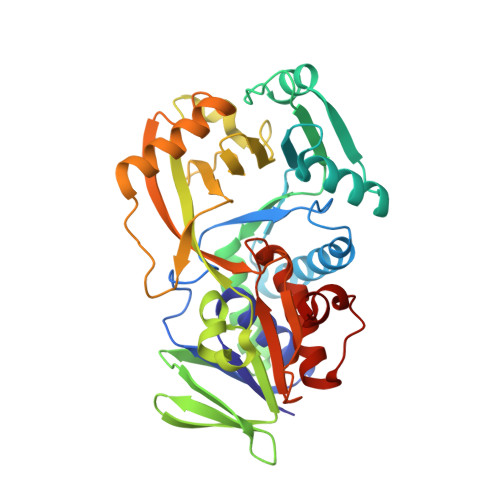Recreating the natural evolutionary trend in key microdomains provides an effective strategy for engineering of a thermomicrobial N-demethylase.
Xin, Y., Shen, C., Tang, M., Guo, Z., Shi, Y., Gu, Z., Shao, J., Zhang, L.(2022) J Biological Chem 298: 101656-101656
- PubMed: 35124004
- DOI: https://doi.org/10.1016/j.jbc.2022.101656
- Primary Citation of Related Structures:
7EXS - PubMed Abstract:
N-demethylases have been reported to remove the methyl groups on primary or secondary amines, which could further affect the properties and functions of biomacromolecules or chemical compounds; however, the substrate scope and the robustness of N-demethylases have not been systematically investigated. Here we report the recreation of natural evolution in key microdomains of the Thermomicrobium roseum sarcosine oxidase (TrSOX), an N-demethylase with marked stability (melting temperature over 100 °C) and enantioselectivity, for enhanced substrate scope and catalytic efficiency on -C-N- bonds. We obtained the structure of TrSOX by crystallization and X-ray diffraction (XRD) for the initial framework. The natural evolution in the nonconserved residues of key microdomains-including the catalytic loop, coenzyme pocket, substrate pocket, and entrance site-was then identified using ancestral sequence reconstruction (ASR), and the substitutions that accrued during natural evolution were recreated by site-directed mutagenesis. The single and double substitution variants catalyzed the N-demethylation of N-methyl-L-amino acids up to 1800- and 6000-fold faster than the wild type, respectively. Additionally, these single substitution variants catalyzed the terminal N-demethylation of non-amino-acid compounds and the oxidation of the main chain -C-N- bond to a -C=N- bond in the nitrogen-containing heterocycle. Notably, these variants retained the enantioselectivity and stability of the initial framework. We conclude that the variants of TrSOX are of great potential use in N-methyl enantiomer resolution, main-chain Schiff base synthesis, and alkaloid modification or degradation.
- The Key Laboratory of Industrial Biotechnology, Ministry of Education, National Engineering Laboratory for Cereal Fermentation Technology, Jiangnan University, Wuxi, Jiangsu, China. Electronic address: yuxin@jiangnan.edu.cn.
Organizational Affiliation:




















